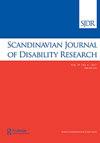个人就是政治——然后呢?瑞典残疾人组织的意识形态、代表性和合法性
IF 1.7
Q2 REHABILITATION
引用次数: 0
摘要
背景:在残疾人权利运动中,谁可以或不能代表其他成员已经讨论了几十年,主要是关于残疾作为资格先决条件。目的:目的是分析瑞典残疾人权利组织(DHR,残疾人人权)内关于代表性要求的争论。方法:每位DHR成员都有机会回答三个开放式问题。对答案进行定性内容分析。结果:发现了争论的两个主要维度。意识形态维度通过生活经验或人权方法使代表合法化。实用主义维度通过关系要求或组织需要使表现合法化。进一步的分析揭示了一个悖论:当一个代表被要求拥有一个具有某些特征的身体时,其他与知识相关的方面就有贬值的风险。结论:矛盾的是,该组织的目标是使残疾与社会无关,而使残疾成为选举代表时的主要问题。本文章由计算机程序翻译,如有差异,请以英文原文为准。
The Personal is Political – And Then What? Ideology, Representation, and Legitimacy in a Swedish Disability Organisation
Background: Who can or cannot claim to represent other members within the disability rights movement has been discussed for decades, mainly concerning being disabled as an eligibility prerequisite. Aim(s): The aim is to analyse arguments concerning representational claims within a Swedish disability rights organisation (DHR, Disability Human Rights). Method: Every member of DHR was given the opportunity to answer three open-ended questions. Answers were subjected to a qualitative content analysis. Results: Two main dimensions of arguments were found. The ideological dimension legitimises representation through lived experience or a human rights approach. The pragmatic dimension legitimises representation through relational claims or organisational necessities. Further analysis revealed a paradox: When a representative is required to have a body with certain characteristics, other knowledge-related aspects risk devaluation. Conclusion(s): Paradoxically, the organisation has a goal of rendering impairment irrelevant in society, while rendering impairment a main issue when electing representatives.
求助全文
通过发布文献求助,成功后即可免费获取论文全文。
去求助
来源期刊

Scandinavian Journal of Disability Research
REHABILITATION-
CiteScore
3.20
自引率
0.00%
发文量
13
审稿时长
16 weeks
 求助内容:
求助内容: 应助结果提醒方式:
应助结果提醒方式:


